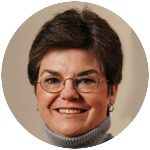
Effie Caldarola
Like life itself, Lent starts out nice and slow. And suddenly, Easter is upon us.
There may have been a Lenten midway point, or maybe as Holy Week began, we realized that Lent has sped by. We ask ourselves, Did I do enough? It’s human nature to feel like maybe we should have done more. There’s always more.
As my deacon friend replied when people asked how much money they should donate: “Give more.” That’s the standard we humans set for ourselves and sometimes that causes negative self-talk or disappointment.
So, perhaps we should look instead at what we’ve learned and, most important, what God has done in us. As John’s Gospel reminds us, God loved us first. Like the prodigal’s father, God is always waiting and welcoming, unconditionally loving. God — and Easter — always offers hope.
Easter season invites us into 50 days of celebration. Not because, on that early morning when a group of women discovered an empty tomb, everything was perfect and earth’s problems disappeared. But rather, because on that morning, hope was born anew into a broken world.
[tower]
This year, I noticed many retreats and websites offered hope as a Lenten theme. Not because everything is so rosy, but perhaps because on this earth right now, everything seems bleak. We need hope more than ever.
The invasion and suffering of Ukraine began almost as Lent did. It shadowed us as we prayed, abstained and “gave up” as an offering. It dominated the news and pushed the pandemic from the headlines.
But it didn’t keep away this news: We were reminded of how little time we have to stave off the worst effects of climate change. Worldwide, the impact is greatest on the poor, and this impact will increase migration at a time when millions around the world are on the move, seeking refuge at doors often closed to them.
We ask, Where are our leaders on climate change? Why are we worrying about where to get cheaper gas rather than how to limit fossil fuel consumption?
How, we ask, do we find hope in these times?
During Lent, I read a story of a religious sister working among impoverished people in a foreign land. I don’t remember her name or the country, but words she spoke about her life framed my Lenten experience: “My needs,” she said, “are few and simple.”
Those words began to follow me, in a hopeful and positive way, as I shopped. Do I really need this? Does this contribute to the simplicity that would deepen my spirituality?
Pope Francis has remarked that in Western culture, the presence of God “is diluted by consumerism,” and those words, too, should follow us.
We are tied to this earth. Its pain and destruction are ours. But with every tree we plant, with every article of extra clothing or unnecessary plastic we reject, we feel a sense of hope in God’s presence.
I feel hope when I visit the Catholic Climate Covenant website because I see answers and actions I can take.
I feel hope when I see in the bulletin of a local parish that their Care for Creation Committee is hosting a teach-in on “How to Lower Your Carbon Footprint.” I have hope that more parishes will embrace this, and more church leaders will prioritize climate change and Pope Francis’ encyclical, “Laudato Si’, on Care for Our Common Home.”
I see hope in the worldwide outpouring of help to Ukrainian refugees.
“Hope never disappoints,” Pope Francis said, “hope goes not alone, but together.”
I feel Easter hope in community. That’s where we find strength.
PREVIOUS: Good Friday shows how suffering unleashes love in the world
NEXT: A study of ‘Christ in Limbo’



Share this story